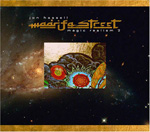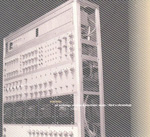Recent Listening, Spring 2005

But Pale Rider is different. Whilst some of the songs are given a pseudo Beach Boys treatment [I kid you not ≠ itís truly bizarre!], many, especially as the CD proceeds, are left stark and minimal, skeletal even, with Rossí piano and voice to the fore. Elsewhere, the music is textural and intriguing, giving light and shade to the songs. And whilst Ross is not the worldís greatest lyricist, here his songs of love and loss, desire and faith, engage and intrigue.
Jon Hassellís Faarifa Street: Magic Realism 2 [Label Bleu] is also full of light and shade, and most of all what I can only call magic. Using live recordings, these seven lengthy tracks have been collaged, layered and built upon to produce dense, shifting layers of sound, rather as 1970ís Miles Davis was sculpted by the record producers into something new. Hassellís trumpet can be likened to Milesí of course, although global music has to be thrown into the mix, and thereís a lot less funk to be found. Iíve always loved Jon Hassellís work, but had felt heíd fallen into generalisation and repetition. Here, however, the music is alive and reinvigorated, texturally and sonically intriguing.
Unlike Jon Hassell, Dave Douglas is pretty prolific, but like Hassell he has found something new to inject into what he makes. On Mountain Passages [Koch] the music is made in memoriam of his father, a mountain runner, and this idea of traversing at speed, of high altitudes and space, informs the music. Although still recognisably Douglas, with awkward New York post-rock/jazz/contemporary-classical phrasing and tone, the music here is informed by some other kind of , perhaps imaginary, ethnic folk music. With tuba, cello, clarinets as well as drums and Douglasí trumpet itís occasionally like a colliery band on drugs, but beautifully restrained and controlled. The coverís beautiful, too.
And talking of Miles, Henry Kaiser and Wadada Leo Smithís ĎYo Miles!í project has a third CD out on Cuneiform. Upriver, a double, is pretty much full of revisited and reconsidered 1970s Miles music. Itís dense, gnarly, funky stuff, with the ten-piece band pretty much at full throttle throughout. Just as Milesí band did at the time, Yo Miles! take the stated themes and then take them apart, explore them, dissect them, charge at them, and then glue them back together over percussion to die for. Upriver is the best yet from this energetic big band.

As is, according to many of my friends, the music that alog make. Personally, I think its glorious. miniatures [rune grammafon] clicks, whirrs, ticks, beeps and twitters its way out of the stereo in a wondrous fashion. After careful listening, itís apparent simplicity gives way to depth, texture and new sound, propelled along on relentless shimmering rhythms. Iskra 1903, a triple CD on Emanen, works in a similar way, although here the music is acoustic. Jazz improvisers Paul Rutherford, Derek Bailey and Barry Guy gradually feel their way toward a slow-motion music reminiscent of Takemitsuís sonic sweep or Morton Feldmanís tonal drift. Baileyís alarming splintered electric guitar is put to good use as it intertwines with Rutherfordís noisy trombone above Guyís intriguing and often a-rhythmic double bass. Yet more proof that the early 1970s werenít the musical waste land they are often claimed to have been.
Quiet in a different way are the three new CD EPs of music on Cold Blue. Never has a label been so aptly named, and here they continue their obsession with various takes on slow, pastoral, beautiful minimalism. Kyle Gahnís long night is a spectral piece for three pianos, Jim Foxís descansos, past a more straightforward work for strings [4 cellos and a double bass], Rick Coxís Fade a noisier [only by contrast, you understand] and intriguing piece for guitar, piano, bass and signal processors. Here is the sound of dusk and early morning, a shimmering, echoing drone-based composition that gets better with each and every listen. Cold Blueís consistency and dedication is to be applauded, as is their packaging.
And disappointments? Well, Silver Mt Zionís Horses in the Sky [constellation] is simply more of the same: exaggerated dynamics and pseudo-political commentary; Over the Rhinesí Drunkardís Prayer [Back Porch] comes across as mainstream pop, almost tired cabaret, rather than their normal intriguing balladry and pop; and the long-awaited and much-heralded Dreams Come True by Judee Sill [Water] is, despite the exquisite packaging, truly appalling. Thereís a CDs-worth of music spread over two, much of the live stuff is substandard bootleg material that many fans will have, and the unreleased album has been turned into MOR muzak by Jim OíRourke. Personally, Iíd have rather had the bare bones of the songs than this sonic mush. Ah well, itís only rock & roll; and I like it.
© 2005 Rupert Loydell